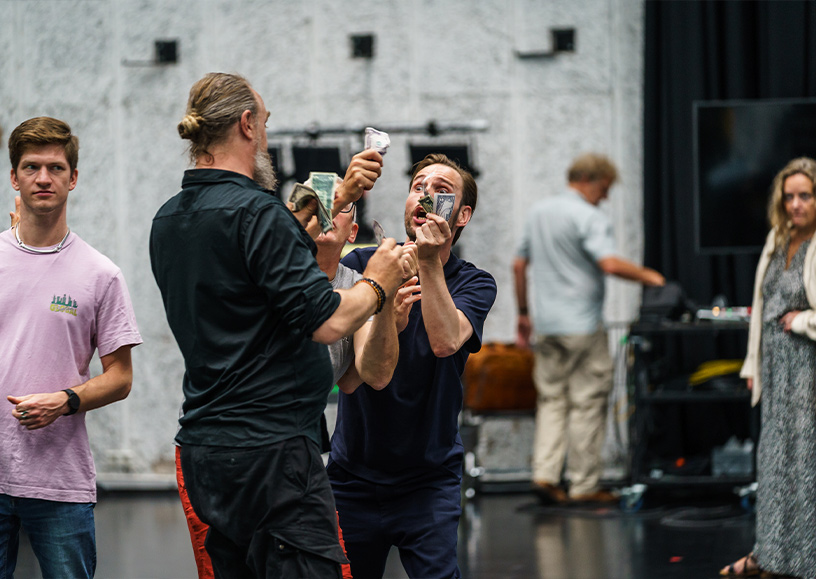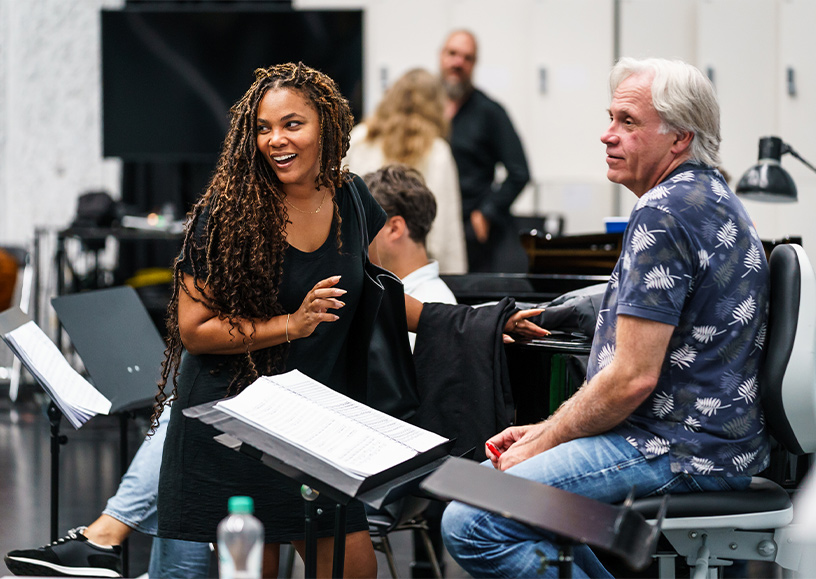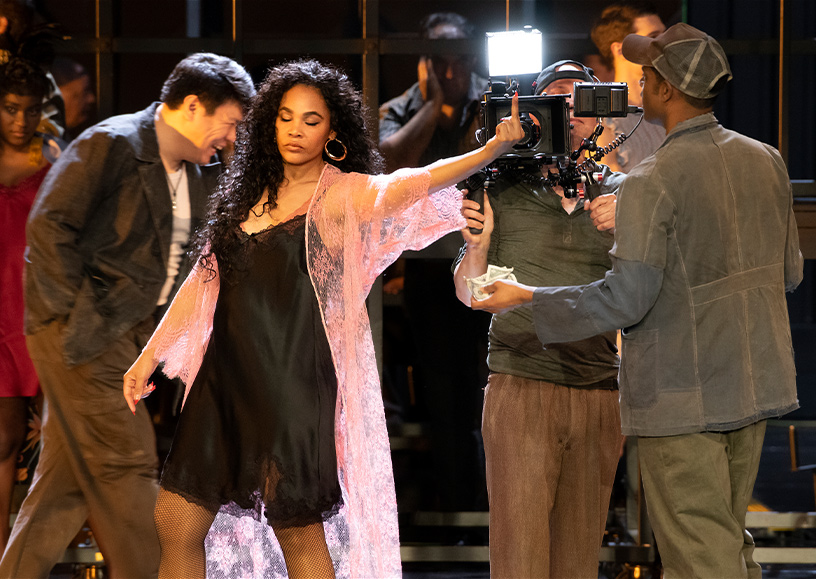
Ivo van Hove: ‘All my productions are autobiographies in disguise’
The chance to direct Aufstieg und Fall der Stadt Mahagonny (1930) is a long-cherished dream come true for Ivo van Hove. That is not just because of the fantastic music but also because Bertolt Brecht and Kurt Weill’s famous opera allows parallels to be drawn between the 1920s and the 2020s. The ‘epic theatre’ of Brecht and Weill reverberates in Van Hove’s stage direction, for example in his ingenious use of audio-visual techniques.
Text: Margriet Prinssen
In 1986, the dramaturg Klaas Tindemans asked the then 27-year-old Ivo van Hove whether he could ever imagine directing an opera. In the interview in the performing arts trade magazine Etcetera, Van Hove admits to feeling a certain reluctance: “You really need to have mastered your craft, or else you’re a sitting duck.” He adds, “I would say my productions are actually very musical, so that’s one reason at least to want to do it. Another reason is that it’s such a massive challenge for a theatre maker. Everything is there already; an opera is much less bare than the script of a play, and I imagine you have far less control over the singers. As a director, you can’t really ‘mould’ the musical aspect.”
It would be another thirteen years before Van Hove actually took on the challenge of an opera, with Alban Berg’s Lulu for Opera Ballet Vlaanderen in 1999. Since then, he has added more than fifteen operas to his repertoire, including Wagner’s complete Ring des Nibelungen (2006-2008, also for Opera Ballet Vlaanderen). At Dutch National Opera, he has directed The Makropulos Affair (2002), Iolanta (2004), Der Schatzgräber (2012) and Salome (2017).
When asked about the difference in intensity between theatre and opera in an interview in the Flemish magazine De Tijd when Lulu premiered, he replied, “First and foremost, you have the amazing way music can whip up emotions. There are also those moments when the characters sing across one another, often in total confusion — something that’s almost inconceivable in theatre. Talking or singing across one another requires the utmost concentration. In an opera you do hear eventually what everyone is ‘saying’. Berg, and Mozart too, use that approach to quite brilliant effect.”

Love of opera
His love of opera started when he was about twenty and saw La clemenza di Tito, directed by Karl-Ernst Herrmann, on the television. It was a huge eye-opener to discover opera did not need to be something traditional and old-fashioned. “So there is an alternative.” At that point, he already knew Karl-Ernst Herrmann from Peter Stein’s Schaubühne in Berlin. “That was where drama theatre came to maturity, which you could see reflected in that opera,” he explains to Karin Veraart in her book Ivo van Hove. Regisseur, mentor, manager. Robert Wilson, Peter Stein and Patrick Chereau: these were the people whose work has informed his views on making theatre and who inspired him from an early age. “What I want to do with the actors, with a script — with theatre, in other words— is to try and give a physical representation of a character’s psychological development.”
At first he created his own montage-like productions (Ziektekiemen, Geruchten), collaborating closely from the start with the set designer Jan Versweyveld, who is also his life partner. Van Hove’s career took off rapidly. He soon made a mark as an artistic director as well thanks to his leadership qualities, fulfilling this role with the Flemish groups AKT, Akt-Vertikaal and De Tijd before moving to the Netherlands to become artistic director of Het Zuidelijk Toneel (1990-2000).
He gradually worked his way through the theatrical standards. For example, he staged Shakespeare’s Troilus and Cressida back in 1986. Perhaps surprisingly, he discovered that the ‘safe’ words of the classics, spoken by characters from a distant time, gave him more scope for personal statements. He said later that from then on, he chose plays with themes that resonated with him personally at that particular time. Indeed, he calls his productions “autobiographies in disguise”.

Toneelgroep Amsterdam
In 2001, Van Hove became the director of the theatre company known then as Toneelgroep Amsterdam (now Internationaal Theater Amsterdam). After a difficult start with some inevitable changes of personnel, he consolidated his reputation as a stage director specialising in innovative, multi-faceted works that never failed to cause a stir. He was able to bolster the ensemble, bringing in actors such as a very young Halina Reijn, who became a kind of muse to him. He turned Toneelgroep Amsterdam into a leading theatre company, both nationally and, increasingly, internationally too. Van Hove created a diverse oeuvre: impressive book adaptations such as The Fountainhead, based on Ayn Rand’s controversial novel, and his trilogy of adaptations of works by the Dutch fin-de-siècle author Louis Couperus (De stille kracht, Van oude mensen, de dingen die voorbijgaan and De boeken der kleine zielen); film adaptations such as Opening Night by John Cassavetes and Ingmar Bergman’s Scenes from a Marriage; and last but not least a number of unforgettable marathon productions. In the six-hour-long Roman Tragedies, members of the audience could move freely among the actors, eliminating the boundary between the house and the stage. In the marathon production Kings of War he combined three of Shakespeare’s history plays — Henry V, Henry VI and Richard III — in a thematic whole that became a stunning exploration of power and its abuse.
Global success
Several of his major productions (Roman Tragedies, Opening Night, Angels in America, A Little Life and Kings of War) have been shown around the world, from Taipei to Paris and from London to New York. As an innovative theatre maker, he has been increasingly in demand, including for musicals. He collaborated with David Bowie on Lazarus and directed West Side Story on Broadway.
The same stylistic principles that he uses in the opera were seen there too. His theatre is always an overwhelming experience and he is not afraid of powerful emotions. Jan Versweyveld’s designs are often grand and highly stylised, visually spectacular in a way that reinforces the drama unfolding on stage. Van Hove comes into his own in large theatres, but he is also prepared to tackle more intimate productions. A good example is La voix humaine, the Jean Cocteau monologue played to great acclaim by Halina Reijn; she toured the world for more than ten years in this role.
Live video
Van Hove’s reputation as a theatrical innovator is due in no small part to his use of live video, which adds another layer to what is seen on stage. The spectators watch the scene as a whole but at the same time they see the actors or singers in close-up.
The set for Mahagonny even uses green screens, like the ones used in Hollywood films. Van Hove sees them as a telling metaphor for the artificiality of the city of Mahagonny. Everything is fake: you can even have sex with a woman who is not real. The city’s inhabitants try to create an earthly paradise but they end up living an illusion in a fantasy world. Mahagonny is a fata morgana, like a trick of the light. Van Hove: “A society obsessed with hedonistic pleasures on the cheap and making a quick profit is doomed to collapse. Kurt Weill and Bertolt Brecht’s work is a penetrating analysis of capitalism.”
Aufstieg und Fall der Stadt Mahagonny is to be seen at Dutch National Opera & Ballet from 6 to 27 September 2023

Ivo van Hove
Ivo van Hove (1958) grew up in a Flemish mining village, rebelled as a punk youth against the Flemish theatre establishment and went on to become one of the greatest international theatre makers of our times. He was the director of Internationaal Theater Amsterdam (previously Toneelgroep Amsterdam) from 2001 to September 2023. Van Hove was also the director of the Holland Festival from 1998 to 2004. As of this November, he will be the new artistic director of the Ruhrtriennale for the period 2024-2026.
In recent years he has staged productions for companies in London, New York and Paris, he has received major awards and he has enjoyed success in the West End and on Broadway, collaborating with international stars such as David Bowie, Isabelle Huppert, Bryan Cranston, Jude Law and Juliette Binoche.
In May 2023, Van Hove’s direction of Don Giovanni premiered at the Metropolitan Opera, in a co-production with the Opéra National de Paris. He also received the French State’s highest cultural accolade in May, when he was made Commandeur dans l’Ordre des Arts et des Lettres. Van Hove continues to work for Internationaal Theater Amsterdam as a guest director and consultant.
Aufstieg und Fall der Stadt Mahagonny is to be seen at Dutch National Opera & Ballet from 6 to 27 September 2023